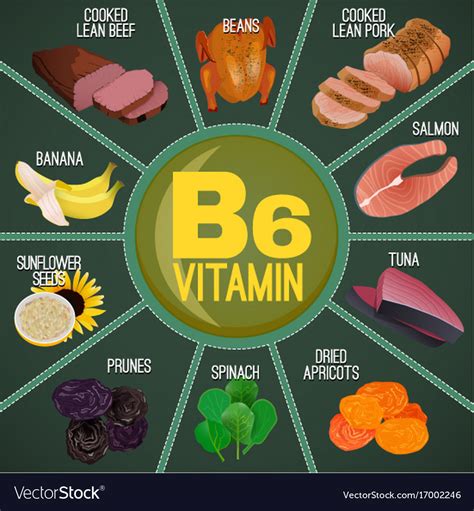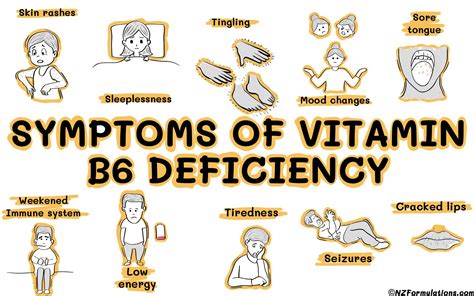Intro
Discover the 6 benefits of Vitamin B6, including energy boosts, brain function support, and immune system enhancement, with related nutrients like folate and riboflavin, for overall health and wellness.
Vitamin B6, also known as pyridoxine, is a water-soluble vitamin that plays a crucial role in various bodily functions. It is an essential nutrient that supports brain function, immune system function, and the formation of red blood cells. Vitamin B6 is found in a variety of foods, including meat, fish, poultry, whole grains, and some fruits and vegetables. A deficiency in vitamin B6 can lead to a range of health problems, including anemia, fatigue, and weakness. In this article, we will explore the benefits of vitamin B6 and how it can improve overall health and well-being.
Vitamin B6 is involved in many bodily processes, including energy metabolism, nerve function, and immune system function. It helps to convert food into energy, which is essential for maintaining healthy skin, hair, and eyes. Vitamin B6 also plays a role in the production of neurotransmitters, such as serotonin and dopamine, which regulate mood and emotions. In addition, vitamin B6 is necessary for the production of white blood cells, which helps to fight off infections and diseases.
The importance of vitamin B6 cannot be overstated. It is a vital nutrient that supports overall health and well-being. Vitamin B6 deficiency can lead to a range of health problems, including anemia, fatigue, and weakness. It can also increase the risk of heart disease, stroke, and certain types of cancer. On the other hand, adequate intake of vitamin B6 can help to prevent these health problems and promote overall health and well-being. In this article, we will explore the benefits of vitamin B6 in more detail and discuss how it can be incorporated into a healthy diet.
Benefits of Vitamin B6

Vitamin B6 has several benefits, including reducing the risk of heart disease, stroke, and certain types of cancer. It also helps to regulate homocysteine levels in the blood, which is associated with a reduced risk of cardiovascular disease. Additionally, vitamin B6 is involved in the production of neurotransmitters, such as serotonin and dopamine, which regulate mood and emotions. This can help to reduce the risk of depression, anxiety, and other mental health disorders.
Reducing Inflammation
Vitamin B6 has anti-inflammatory properties, which can help to reduce inflammation in the body. Chronic inflammation is associated with a range of health problems, including heart disease, cancer, and Alzheimer's disease. Vitamin B6 helps to reduce inflammation by inhibiting the production of pro-inflammatory cytokines, which are molecules that promote inflammation.Vitamin B6 and Brain Function

Vitamin B6 plays a crucial role in brain function and development. It is involved in the production of neurotransmitters, such as serotonin and dopamine, which regulate mood and emotions. Vitamin B6 also helps to maintain healthy nerves, which is essential for transmitting signals between the brain and the rest of the body. Additionally, vitamin B6 is involved in the production of myelin, which is the fatty substance that surrounds nerve fibers and helps to transmit signals.
Improving Mood
Vitamin B6 has been shown to improve mood and reduce the risk of depression and anxiety. It helps to regulate the production of neurotransmitters, such as serotonin and dopamine, which are associated with feelings of happiness and well-being. Vitamin B6 also helps to reduce stress and anxiety by regulating the production of cortisol, which is the hormone that regulates stress response.Vitamin B6 and Heart Health

Vitamin B6 is essential for maintaining healthy heart function. It helps to regulate homocysteine levels in the blood, which is associated with a reduced risk of cardiovascular disease. Vitamin B6 also helps to reduce inflammation, which is associated with a reduced risk of heart disease. Additionally, vitamin B6 is involved in the production of red blood cells, which is essential for maintaining healthy blood flow.
Reducing Blood Pressure
Vitamin B6 has been shown to reduce blood pressure in people with hypertension. It helps to regulate the production of nitric oxide, which is a molecule that helps to relax blood vessels and reduce blood pressure. Vitamin B6 also helps to reduce inflammation, which is associated with a reduced risk of cardiovascular disease.Vitamin B6 and Cancer Prevention

Vitamin B6 has been shown to have anti-cancer properties, particularly in reducing the risk of colorectal cancer. It helps to regulate the production of genes that are involved in cell growth and division, which can help to reduce the risk of cancer. Vitamin B6 also helps to reduce inflammation, which is associated with a reduced risk of cancer.
Reducing Oxidative Stress
Vitamin B6 has antioxidant properties, which can help to reduce oxidative stress in the body. Oxidative stress is associated with a range of health problems, including cancer, heart disease, and Alzheimer's disease. Vitamin B6 helps to reduce oxidative stress by inhibiting the production of free radicals, which are molecules that damage cells and DNA.Vitamin B6 and Immune System Function

Vitamin B6 is essential for maintaining healthy immune system function. It helps to regulate the production of white blood cells, which are essential for fighting off infections and diseases. Vitamin B6 also helps to reduce inflammation, which is associated with a reduced risk of infections and diseases.
Reducing Infections
Vitamin B6 has been shown to reduce the risk of infections, particularly in older adults. It helps to regulate the production of white blood cells, which are essential for fighting off infections and diseases. Vitamin B6 also helps to reduce inflammation, which is associated with a reduced risk of infections and diseases.Vitamin B6 Deficiency

Vitamin B6 deficiency can lead to a range of health problems, including anemia, fatigue, and weakness. It can also increase the risk of heart disease, stroke, and certain types of cancer. Vitamin B6 deficiency can be caused by a range of factors, including a poor diet, certain medical conditions, and certain medications.
Treating Vitamin B6 Deficiency
Vitamin B6 deficiency can be treated with supplements or by increasing dietary intake of vitamin B6-rich foods. It is essential to consult with a healthcare professional before taking any supplements, as they can interact with other medications and have side effects.Food Sources of Vitamin B6

Vitamin B6 is found in a variety of foods, including meat, fish, poultry, whole grains, and some fruits and vegetables. Some of the richest sources of vitamin B6 include:
- Chicken
- Fish
- Beef
- Pork
- Lamb
- Whole grains
- Brown rice
- Quinoa
- Sunflower seeds
- Pumpkin seeds
- Squash
- Sweet potatoes
- Carrots
- Bananas
- Avocados
Increasing Dietary Intake
Increasing dietary intake of vitamin B6 can help to prevent deficiency and promote overall health and well-being. It is essential to eat a balanced diet that includes a variety of whole foods, such as fruits, vegetables, whole grains, lean proteins, and healthy fats.What are the symptoms of vitamin B6 deficiency?
+The symptoms of vitamin B6 deficiency include anemia, fatigue, weakness, and neurological problems, such as numbness and tingling in the hands and feet.
How can I increase my dietary intake of vitamin B6?
+You can increase your dietary intake of vitamin B6 by eating a balanced diet that includes a variety of whole foods, such as fruits, vegetables, whole grains, lean proteins, and healthy fats. Some of the richest sources of vitamin B6 include chicken, fish, beef, pork, lamb, whole grains, brown rice, quinoa, sunflower seeds, pumpkin seeds, squash, sweet potatoes, carrots, bananas, and avocados.
Can vitamin B6 supplements interact with other medications?
+Yes, vitamin B6 supplements can interact with other medications, such as blood thinners, and decrease their effectiveness. It is essential to consult with a healthcare professional before taking any supplements, as they can interact with other medications and have side effects.
In summary, vitamin B6 is an essential nutrient that plays a crucial role in various bodily functions, including energy metabolism, nerve function, and immune system function. It has several benefits, including reducing the risk of heart disease, stroke, and certain types of cancer, as well as improving mood and cognitive function. Increasing dietary intake of vitamin B6 can help to prevent deficiency and promote overall health and well-being. If you have any questions or concerns about vitamin B6, please do not hesitate to reach out to a healthcare professional. We hope this article has provided you with valuable information about the importance of vitamin B6 and how it can improve your overall health and well-being. Please share this article with your friends and family, and leave a comment below if you have any questions or concerns.
